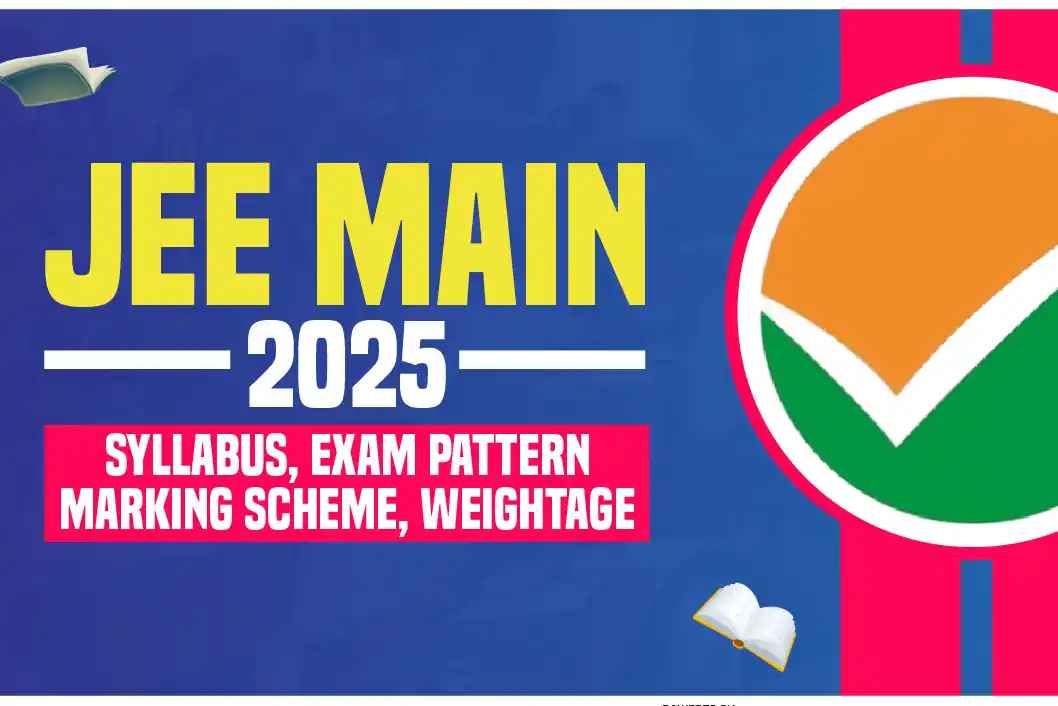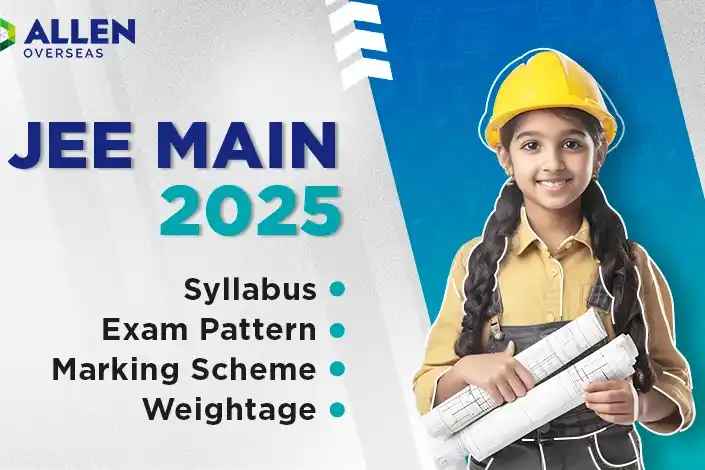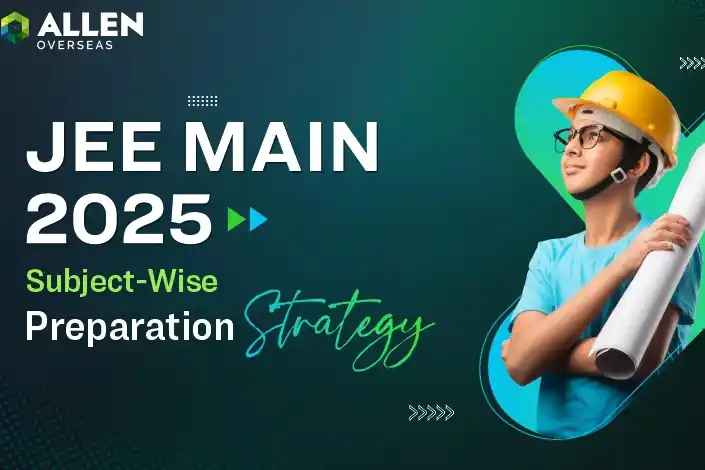NTA JEE Mains 2025: Complete Guide to Exam Structure, Syllabus, and Preparation
Updated on : 02 January , 2025

Image Source: pwgulf.com
Introduction
The Joint Entrance Examination (JEE) Mains is one of the most significant competitive exams in India, primarily for students aspiring to pursue undergraduate engineering programs. Conducted by the National Testing Agency (NTA), JEE Mains serves as a gateway to prestigious institutions such as the Indian Institutes of Technology (IITs), National Institutes of Technology (NITs), and other top engineering colleges. As we approach JEE Mains 2025, understanding its structure, syllabus, and preparation strategies becomes crucial for aspirants.
Overview of JEE Mains

Image Source: allenoverseas.com
JEE Mains is a crucial national-level entrance examination in India for aspiring engineering students. Conducted by the National Testing Agency (NTA), it assesses proficiency in Physics, Chemistry, and Mathematics. The exam occurs twice annually, in January and April, allowing candidates multiple attempts. JEE Mains scores are essential for admission to various engineering colleges and serve as a qualifying criterion for JEE Advanced, necessary for entry into the Indian Institutes of Technology (IITs).
| Feature | Details |
|---|---|
| Exam Duration | 3 Hours |
| Total Marks | 300 Marks (Paper 1) |
| Total Questions | 75 Questions (25 each from Physics, Chemistry, Mathematics) |
| Exam Mode | Computer-based |
| Negative Marking | Yes, 1 mark deducted for incorrect answers |
| Languages Offered | 13 languages including English and Hindi |
| Purpose | Admissions to NITs, IIITs, IITs, and other institutes |
Significance of Exams
The significance of JEE Mains extends well beyond college admissions, impacting various aspects of a student's academic and professional journey. Here are the key points:
-
Access to Top Institutions: JEE Mains is the gateway to prestigious engineering colleges in India, including NITs, IIITs, and other government-funded technical institutes. A good score opens doors to these sought-after institutions, enhancing educational prospects.
-
Career Opportunities: High scores in JEE Mains can lead to lucrative job opportunities across diverse sectors such as technology, research, and development. Graduates from top engineering colleges are often highly sought after in the job market.
-
Foundation for Higher Studies: Performing well in JEE Mains not only facilitates undergraduate admissions but also lays a solid foundation for further studies in engineering and technology fields, including eligibility for JEE Advanced, which is essential for IIT admissions.
Popular Blogs
Conducting Authority: National Testing Agency (NTA)
The National Testing Agency (NTA) is the designated authority responsible for conducting the Joint Entrance Examination (JEE) Mains. Established by the Ministry of Education, Government of India, the NTA aims to enhance the quality of education by streamlining examination processes, ensuring transparency, and effectively utilizing technology.

Image Source: northeastlive.s3.amazonaws.com
| Aspect | Details |
|---|---|
| Established | 2017 |
| Purpose | Conduct entrance exams for higher education |
| Exams Conducted | JEE Mains, NEET, NET, CMAT, GPAT |
| Exam Frequency | Twice a year (January and April) |
| Mode of Examination | Computer-based testing (CBT) |
| Mission | Improve quality, efficiency, and transparency in education assessments |
Exam Structure
JEE Mains consists of three distinct papers, each designed for different engineering courses. Below is an overview of the exam structure, including the types of papers, exam pattern, marking scheme, and duration.
Types of Papers
- Paper 1: For B.E/B.Tech courses.
- Paper 2A: For B.Arch courses.
- Paper 2B: For B.Planning courses.
Exam Pattern
Number of Questions
- Paper 1 (B.E/B.Tech): Comprises 90 questions.
- Paper 2A (B.Arch): Includes 82 questions.
- Paper 2B (B.Planning): Contains 105 questions.
Marking Scheme
- Each correct answer awards +4 marks.
- Each incorrect answer incurs a penalty of -1 mark.
- No negative marking for numerical value questions.
Duration and Format of Each Paper
All papers are conducted over a duration of three hours. The format varies as follows:
- Paper 1: Computer-based test with multiple-choice questions (MCQs) and numerical value questions (NVQs).
- Paper 2A: Includes a drawing test that is pen-and-paper based, alongside MCQs.
- Paper 2B: Also computer-based, focusing on planning-related questions.
| Paper Type | Number of Questions | Total Marks | Exam Type |
|---|---|---|---|
| Paper 1 | 90 | 300 | Computer-based |
| Paper 2A | 82 | 400 | Pen-and-paper (Drawing) |
| Paper 2B | 105 | 400 | Computer-based |
Syllabus Overview
The syllabus for JEE Mains is structured around the NCERT curriculum for Classes 11 and 12, encompassing essential topics in Physics, Chemistry, and Mathematics. Understanding this syllabus is crucial for effective preparation.
General Information about the Syllabus
- Source: The syllabus is derived from NCERT textbooks for Classes 11 and 12.
- Subjects Covered:
- Physics
- Chemistry
- Mathematics
Importance of Understanding the Syllabus for Preparation
- Focused Study: Familiarity with the syllabus allows candidates to concentrate on relevant topics, ensuring efficient use of study time.
- Structured Approach: It aids in developing a study plan that aligns with the exam requirements.
Key Topics in Each Subject
| Subject | Key Topics |
|---|---|
| Physics | Electrostatics, Current Electricity, Mechanics, Optics, Modern Physics |
| Chemistry | Stoichiometry, Chemical Equilibrium, Thermodynamics, s-Block and p-Block elements, Organic Chemistry |
| Mathematics | Sets, Relations and Functions, Calculus, Algebra, Coordinate Geometry, Probability and Statistics |
Recent Updates
The NTA has made adjustments to the syllabus by removing certain topics. For instance:
- Mathematics: Mathematical Induction and Reasoning units.
- Physics: Communication Devices.
- Chemistry: Several chapters including Surface Chemistry and Environmental Chemistry.
Detailed Subject-wise Syllabus

Image Source: allenoverseas.com
Paper 1: B.E/B.Tech
Physics
Key topics include:
- Mechanics: Laws of motion, work, energy, and power.
- Thermodynamics: Laws of thermodynamics, heat transfer.
- Waves and Oscillations: Simple harmonic motion, wave properties.
- Electromagnetism: Electrostatics, current electricity, magnetic effects.
- Modern Physics: Quantum theory, atomic models, nuclear physics.
Chemistry
Key areas cover:
- Physical Chemistry: Stoichiometry, chemical equilibrium, thermodynamics.
- Inorganic Chemistry: s-Block and p-Block elements, coordination compounds.
- Organic Chemistry: Hydrocarbons, functional groups, reaction mechanisms.
Mathematics
Focus on:
- Algebra: Sets, relations, functions; complex numbers; quadratic equations.
- Calculus: Differential and integral calculus; limits; continuity.
- Coordinate Geometry: Straight lines, circles, conic sections.
- Trigonometry: Trigonometric ratios and identities.
Paper 2A: B.Arch
Mathematics
Similar topics as Paper 1 with an emphasis on:
- Geometry: Properties of shapes, area and volume calculations.
General Aptitude
Includes:
- Spatial Visualization: Understanding three-dimensional objects from two-dimensional representations.
- Architectural Awareness: Knowledge of architecture and design principles.
Drawing Test
Candidates are evaluated on their drawing skills through:
- Specific techniques such as perspective drawing and composition.
Paper 2B: B.Plan
Mathematics
Similar to Paper 1 but with a focus on:
- Planning-related Applications: Mathematical concepts applied to urban planning scenarios.
General Aptitude
Focuses on:
- Planning Concepts and Techniques: Essential knowledge for effective urban planning practices.
Important Changes in the Syllabus for 2025
Topics Removed from Previous Years
The National Testing Agency (NTA) has revised the syllabus by eliminating several less relevant topics. Key removals include:
Physics:
- Scalars and Vectors
- Vector Addition & Subtraction
- Scalar & Vector Products
- Unit Vectors
- Resolution of Vectors
- Communication Devices
Chemistry:
- Surface Chemistry
- States of Matter
- General Principles and Processes of Isolation of Metals
- Hydrogen
- Environmental Chemistry
- Alcohol, Phenol, and Ether
- Polymers
Mathematics:
- Mathematical Induction
- Mathematical Reasoning
These changes aim to enhance the focus on fundamental concepts that are critical for success in engineering programs.
Focus Areas for Effective Preparation
Given the revisions, students should prioritize the following strategies for effective preparation:
- Understand Core Concepts: Emphasize grasping fundamental principles in Physics, Chemistry, and Mathematics.
- Practice Problem-Solving: Engage in regular practice of problem-solving techniques in the key areas outlined in the syllabus.
- Review Updated Weightage: Note that the weightage for Mathematics has been reduced by approximately 25%, while Physics may see an increased emphasis (up to 35%), and Chemistry's weightage may decrease to around 22.5% for Paper 1.
Summary Table of Changes
| Subject | Removed Topics | Focus Areas |
|---|---|---|
| Physics | Scalars, Vectors, Communication Devices | Mechanics, Thermodynamics, Modern Physics |
| Chemistry | Surface Chemistry, Environmental Chemistry, Polymers | Physical, Organic, Inorganic Chemistry |
| Mathematics | Mathematical Induction, Reasoning | Algebra, Calculus, Coordinate Geometry |
Preparation Strategies
To effectively prepare for JEE Mains 2025, students should adopt a comprehensive strategy that includes recommended study materials, time management tips, and the importance of mock tests. Here’s a detailed guide:
Recommended Study Materials
NCERT Textbooks: These are essential for building foundational concepts in Physics, Chemistry, and Mathematics. Reference Books: Utilize specific reference books for deeper understanding and practice:
- Physics: H.C. Verma
- Chemistry: O.P. Tandon, R.K. Gupta
- Mathematics: R.D. Sharma
Time Management Tips for Effective Study Plans
Structured Timetable: Create a balanced study schedule allocating specific time slots for each subject. Ensure to include:
- Daily study hours for core subjects.
- Regular breaks to enhance focus and retention.
- Revision sessions to reinforce learning.
Prioritize Topics: Focus on high-weightage topics identified from previous years' papers to maximize scoring potential.
Importance of Mock Tests and Previous Year Papers
- Regular Mock Tests: Taking mock tests simulates the exam environment, helping students manage time effectively and build confidence. It also aids in identifying weak areas that need improvement.
- Practice Previous Year Papers: Solving past papers provides insight into the exam pattern and frequently asked questions, allowing students to strategize their preparation accordingly.
FAQs Regarding JEE Mains 2025
Students preparing for JEE Mains 2025 often have several common queries about the exam structure, syllabus, eligibility criteria, and preparation strategies. Here are the answers to some frequently asked questions:
1. What is the structure of JEE Mains 2025?
JEE Mains 2025 consists of three papers:
- Paper 1: For B.E/B.Tech courses, comprising 75 questions (25 each from Physics, Chemistry, and Mathematics).
- Paper 2A: For B.Arch courses, including Mathematics, General Aptitude, and a Drawing test.
- Paper 2B: For B.Planning courses, focusing on Mathematics and Planning-based questions.
2. What is the marking scheme for JEE Mains?
- Each correct answer awards +4 marks.
- Each incorrect answer incurs a penalty of -1 mark for MCQs.
- There is no negative marking for Numerical Value Type (NVT) questions in Section B.
3. Are there any changes in the exam pattern for 2025?
Yes, significant changes have been made:
- In Paper 1, Section B will now require candidates to answer 5 NVT questions out of a total of 10 without any optional choices.
- The total number of questions has been reduced across all papers, with Paper 1 now containing 75 questions in total.
4. What are the eligibility criteria for JEE Mains?
Candidates must have completed their Class 12 education with Physics, Chemistry, and Mathematics as core subjects. There may also be specific percentage requirements set by individual institutions.
5. When will the JEE Mains be conducted?
JEE Mains will be conducted in two phases: January and April. Each phase will include two papers (Paper 1 and Paper 2).
6. How can I effectively prepare for JEE Mains?
- Utilize NCERT textbooks along with reference books specific to JEE preparation.
- Create a structured study timetable that includes breaks to enhance retention.
- Regularly take mock tests to familiarize yourself with the exam format and identify areas needing improvement.
7. What languages will the exam be conducted in?
The JEE Mains exam will be available in multiple languages including English, Hindi, Assamese, Bengali, Gujarati, Kannada, Marathi, Malayalam, Odia, Punjabi, Tamil, Telugu, and Urdu.
Conclusion
Preparing for JEE Mains 2025 requires a strategic approach, focusing on understanding core concepts and effective time management. Utilize NCERT textbooks alongside reference materials to build a strong foundation in Physics, Chemistry, and Mathematics. Regularly practice with mock tests and previous year papers to familiarize yourself with the exam format and identify areas for improvement. Stay organized with a structured study timetable that includes breaks to prevent burnout. With dedication and the right preparation strategies, you can enhance your confidence and performance, paving the way for success in this crucial examination.















